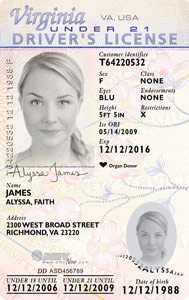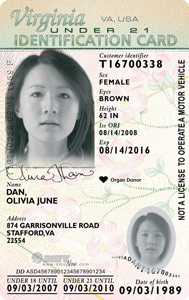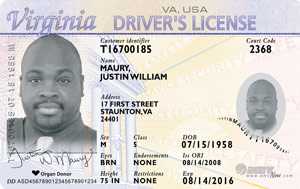The law states that a customer must be at least 21 years of age to purchase alcohol.
Types of Acceptable ID
The acceptable types of identification for determining age include:
- Valid driver's license issued by any state or Washington, DC
- Armed forces identification card
- U.S. passport
- Foreign government visa
- Valid photo identification card issued by Virginia Department of Motor Vehicles.
- Other valid identification issued by any other federal or state government agency (excluding student university and college identification cards) if the identification has a photograph and signature of the subject, with the subject’s height and date of birth
In order to be acceptable, an ID should include a photograph of bearer, signature, height of bearer, date of birth and expiration date. (3 VAC 5-50-20)
Types of unacceptable IDs include college/university ID, expired ID, social security card, government work ID, resident alien card, green card, international driver's license, INS border crosser card and INS worker's authorization card.
Virginia IDs
Cards issued to persons age 15–21 are vertical in format. The background image is of a dogwood flower. If a person attempting to purchase alcohol or tobacco presents a vertical license to you, look extra hard to verify that the person is of legal age! Check the bottom left for the dates that the person turns 18 and 21 years of age.


Cards issued to people age 21 and over are horizontal in format. The background image is of the state capitol. Check the expiration date to verify that the card is valid.

Detecting Fake IDs
Fake identification can take various forms, including:
- False ID: manufactured or computer generated
- Altered ID: valid identification that is altered to change critical information
- Borrowed ID: valid identification used by another person
If you are unsure whether an ID is valid, do not sell alcoholic beverages. One technique is to compare the ID to a secondary form of identification. Examples may include a credit card, social security card, student ID, and a fishing or hunting license. Be careful when accepting any ID as a second form to ensure that the second form of ID is valid. Hold them both together and compare to see if they match.
F-L-A-G is a simple way to remember how to properly check ID:F—Feel
- Have the customer remove the ID from their wallet or plastic holder. You may see another ID in their wallet.
- Feel for raised edges, glue lines or bumpy surfaces by the photo or birth date. Uneven surfaces often indicate tampering. Feel for cut-out or pasted information.
- Check the thickness of the ID. Check to see if it was re-laminated after changing some of the information.
L—Look
- Photograph: Does it look like the person in front of you? Hairstyles and makeup can change, so focus your attention on the person's eyes, nose and chin. When checking men with beards or mustaches, cover the facial hair portion of the photo and concentrate on the eyes, nose or ears.
- Height: Does the height listed reasonably match the person?
- State seal: Is it on the ID and is it in the correct place?
- Date of birth: Is the person old enough? Figure the math or look at the "Under 21 Until" portion of the ID.
- Age on ID vs. appearance: Does the person in front of you match the age on the ID?
- Expiration date: Is the ID expired? Expired IDs are unacceptable.
A—Ask
- Ask for their middle name, zodiac sign or year of high school graduation. If someone has to think about their sign or when they graduated, the ID may be false.
- Ask the birth month. If the person responds with a number rather than the name of the month, they may be lying.
- If the customer is with a companion, ask the companion to quickly tell you the customer's name. Any hesitation may indicate deception.
- Ask the customer to sign their name and then compare the signatures to the ID. Sometimes if the ID is false, the customer will sign their true name, rather than the one on the ID.
G—Give Back
- Give the ID back to the customer and make the sale if the ID is valid.
- If the ID is fake or altered, you must still return the ID.
FAQs
Can I take an ID if it’s fake?
The ID is the personal property of the person presenting it to you. Only law enforcement has the right to keep the ID. You have the right to inspect an ID. You may tell the customer that you are going to ask law enforcement to examine the ID. If the customer leaves the store without it, you may turn the ID over to the police. If the customer asks for the ID back, however, you must return it to them. Military IDs are the property of the U.S. government and must be turned over to the U.S. government.
What do I do with an ID someone has left?
Document the incident. Write down a description of the customer, any statements made and if anyone else was with the customer, vehicle description, etc. Call local law enforcement and your ABC special agent. They can investigate and find the person who used it or the person to whom it belongs.
Who is liable?
The individual who makes an illegal sale may be criminally responsible and therefore may be arrested. A conviction of the offense may result in a fine, jail time or both. The business is administratively responsible and therefore may be issued an administrative written violation report. A hearing may be held resulting in monetary fines, suspension of the license or both. Just because an ID was checked at the door, it is still a good idea to check the ID again. The licensee is responsible for every drink that your establishment serves.
Additional Resources
The Drivers License Guide Co. publishes an annual edition of the ID Checking Guide that helps retailers and law enforcement agencies identify fake IDs. Every valid driver's license format is shown in actual size and full color for all 50 states and 10 Canadian provinces. You can order the guide from their website or by calling (800) 227-8827. Virginia ABC is not affiliated with this product and does not endorse this product, but includes it for informational purposes only. It is up to you to verify the accuracy of any training materials used.
Revised June 8, 2022

Need Help?
Special agents are the primary resource for questions related to operating a business with an ABC license. Contact a special agent via your regional ABC office. For step-by-step assistance in banquet licensing, see our Licensing Wizard.Training
Virginia ABC offers free online training to help managers, sellers and servers to become more responsible and better understand ABC laws, rules and regulations. For more information, contact Community Health & Prevention, (804) 977-7440 or [email protected].
Preventing Underage Sales
-
Detecting Fake IDs


